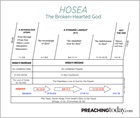Skill Builders
Article
February Four Loves

February is a perfect time to showcase the different dimensions of the meanings of love. Of course, February features Valentine’s Day on the fourteenth, and speaks to a certain kind of love, eros, which is the common pair of glasses through which many perceive love. But there is much more to the word love than erotic love.
This teaching series on the meanings of love is suggestive of how pastors might disciple listeners into a richer understanding of love, especially in a culture that is highly sexualized and, well, erotic.
All these expressions of love laid out in this series characterize the various layers of our humanity and reflect the God-given elements of the different ways in which love is demonstrated and considered. This series on love will provide a lens through which our listeners might better understand love in all its richness and live it out appropriately in their own lives.
In his helpful little book, The Four Loves, C.S. Lewis draws our attention to the differences between the four loves, which inspires this short series.
'Storge' (stor-gay)
This love is family love, affection that is expressed among members of a family. Such love is empathetic, thoughtful, familial love. Parents understand this kind of love. The bond between parent and child is an inexplicable, powerful love that carries the weight of the relationship, no matter what.
Although the exact word storgos is not found in the Bible. The type of familial affection love suggested by this word is found in Romans 12:10, “Be devoted to one another above yourselves.” The word for love is philostorgos.
Lewis notes that “Affection has its own criteria. Its objects have to be familiar.” He underscores that affection might include falling in love or the moment a new friendship began and is the humblest love.
Family affection extends beyond a blood-related family and includes the family of faith in Christ. As a young seminarian who came from a non-Christian home, my family was not able nor interested in supporting my studies. But members from my home church, Ruth and Clark, stepped in where my natural family did not. Ruth told me that her husband Clark said, “Somebody’s got to help that boy.” They did. Throughout my time in seminary, Ruth and Clark sent money to help me train for ministry. Theirs was a poignant expression of storge love.
Capturing a slightly larger scriptural context, a sermon can be developed from Romans 12:9-11 with the homiletical idea being, “Sincere love hates evil and affectionately clings to honoring each other zealously.”
'Philia' (fill-ee-uh)
This love is the love that is expressed between friends. We are all familiar with the city of Philadelphia—the city of brotherly love. Such friend-love reflects love that is as close as siblings.
Lewis says that “To the Ancients, Friendship seemed the happiest and most fully human of all loves; the crown of life and the school of virtue.” Yet, Lewis observes, “The modern world, in comparison, ignores it,” that the modern concept of friendship has little to do with philia. Although many navigate life without genuine philia friendship, what philia offers is a “luminous, tranquil, rational world of relationships freely chosen.”
Jesus’ declaration to his disciples, “You did not choose me, but I chose you” (John 15:16) is a demonstration of a freely chosen relationship. Here, Lewis gives insight, “The Friendship is not a reward for our discrimination and good taste in finding one another out. It is the instrument by which God reveals to each the beauties of all the others.”
Philia friendship fosters relational love. Matt has been a philia friend to me for over four decades. We studied together in seminary. We served different churches in the same area. I was the best man in his wedding, and he was the best man in my wedding. We supported each other in our pursuit of further studies—he eventually left ministry and became a physician and I a professor. He has been a generous friend far beyond what I deserve, a remarkable demonstration of philia love.
Once again, the wider context gives insight into the richer understanding of philia friendship love. A sermon developed from John 15:11-17 provides helpful contours of friendship love with the homiletical idea, “Love as Jesus loved by giving yourself for your friends.”
'Eros' (eh-rows)
This love is a “being in love” kind of love, a romantic love, a passionate love. “Eros” comes from the Greek god, Eros, the son of Aphrodite and the Latin equivalent to Cupid. This passionate love can morph into a selfish, even lustful love. However, Eros love is best expressed in the confines of Christian marriage, according to Lewis.
Lewis’ insights are helpful here. He clarifies,
Sexuality makes part of our subject [Eros] only when it becomes an ingredient in the complex state of “being in love.” The sexual experience can occur without Eros, without being “in love,” and that Eros includes other things besides sexual activity, I take for granted. If you prefer to put it that way, I am inquiring not into the sexuality which is common to us and the beasts or even common to all men but into one uniquely human variation of it which develops within “love”—what I call Eros.
Lewis helps us to understand eros by explaining further. He states, that the “carnal or animally sexual element within Eros, I intend (following an old usage) to call Venus,” is sexual desire.
For Lewis, “Sexual desire, without Eros, wants it, the thing in itself; Eros wants the Beloved.” More specifically, “Eros makes a man really want, not a woman, but one particular woman. In some mysterious but quite indisputable fashion the lover desires the Beloved herself, not the pleasure she can give.” Likewise, the woman wants a particular man, the Beloved himself, not the pleasure he can give.
Marriage has been instructive to me as I have come to see the powerful place that eros love has between a man and a woman. The contours of the covenant of marriage allows my wife and I to recognize and receive the benefits of sexual expression, as we submit ourselves to each other. Marriage serves as the best expression of eros love.
A passage to consider preaching is Ephesians 5:21-33 with the homiletical idea as, “Husbands and wives give yourselves to each other as Christ gave himself for the church.”
'Agape' (ah-gah-pay)
This love is a love that exists no matter the circumstance. It is an unconditional, God-love that is selfless and giving. This is the love of our agape God.
Lewis underscores, “In God there is no hunger that needs to be filled, only plenteousness that desires to give.” He continues, “That such a Gift-love comes by Grace and should be called Charity, everyone will agree.” The grace that God gives through his love is a grace believers can extend to others—believers and those on the way to faith.
Preachers know all too well about the impact of agape love in their own lives. Each one of us has been and is being redeemed by the finished work of the Lord Jesus on the Cross—and are able to live abundantly because of his resurrection and ascension. At the time of our conversion, we may not have fully realized the immense love that God has for us in the giving of his son for our sin.
Coming to terms with agape love is continuous throughout the stages of Christian maturity. We value agape love more and more. What I knew of God’s love for me when I stepped across the line of unbelief to belief is much richer today than when I was at age fourteen and a freshly minted Christian. Agape love is a gift that keeps on giving.
A sermon preached on John 3:1-21 would describe and define the love-giving of God in the person of Jesus Christ. In the Big Idea Companion for Preaching and Teaching, Mary Hulst captures the force of the text with this homiletical idea: “God loves us and want us to have eternal life through Jesus: ‘for God so loved the world’ (3:16) includes us!”
Conclusion
The introduction of the four loves is just that—the beginning or even a refresher of the multifaceted expressions of God’s love to us. We see the dimensions of love in families, friendships, marriages, and grace. What better way to remind our listeners of the deep and textured love that God has for us than to preach the four loves during the month of love.
Scott M. Gibson is the Professor of Preaching and holder of the David E. Garland Chair of Preaching at Baylor University/Truett Seminary in Waco, Texas. He also served as the Haddon W. Robinson Professor of Preaching and Ministry at Gordon-Conwell Theological Seminary in South Hamilton, Massachusetts, where he was on faculty for twenty-seven years.











